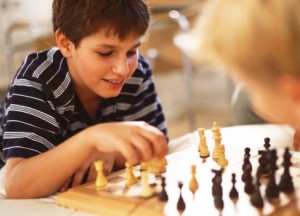
Getty
By Annie Murphy Paul
Until I had children, I couldn't be bothered with playing games. Couldn't stand poker, pinochle or gin rummy. Bored out of my mind by Sorry! and Stratego. Never understood the appeal of chess, checkers or backgammon.
But once I had kids, games took on a new appeal. Apart from entertaining my kids on rainy afternoons, I saw how many different skills games helped to develop. Card games like Uno and Go Fish helped my sons learn to recognize colors and numbers. Board games like Candyland and Chutes and Ladders reinforced their burgeoning conception of a linear number line. And word games like Scrabble and Boggle, which we’re just beginning to try out, promise to expand their vocabularies and enhance their understanding of word stems and endings.
But the biggest benefits of playing games, I’ve come to see, are social. The same kid who responds to the question, “What did you do at school today?” with an impassive “Nothing,” suddenly grows loquacious once there’s a pair of dice or a pack of playing cards between the two of you. Games teach children how to take turns, lose stoically and win graciously (well, most of the time). And there’s another skill that game-playing promotes, one I hadn’t thought about until I read a study published last month in the Proceedings of the National Academy of Sciences: Games push players to try to understand the minds of the other participants. Is she bluffing? Is he
clueless, or just playing dumb? Can everyone tell that I’m planning to go out in a blaze of glory on the next round?
The study, conducted by a group of researchers from the University of California, Berkeley, used functional magnetic resonance imaging to show that different brain regions are active when individuals play a game against other people and when they play against themselves.

